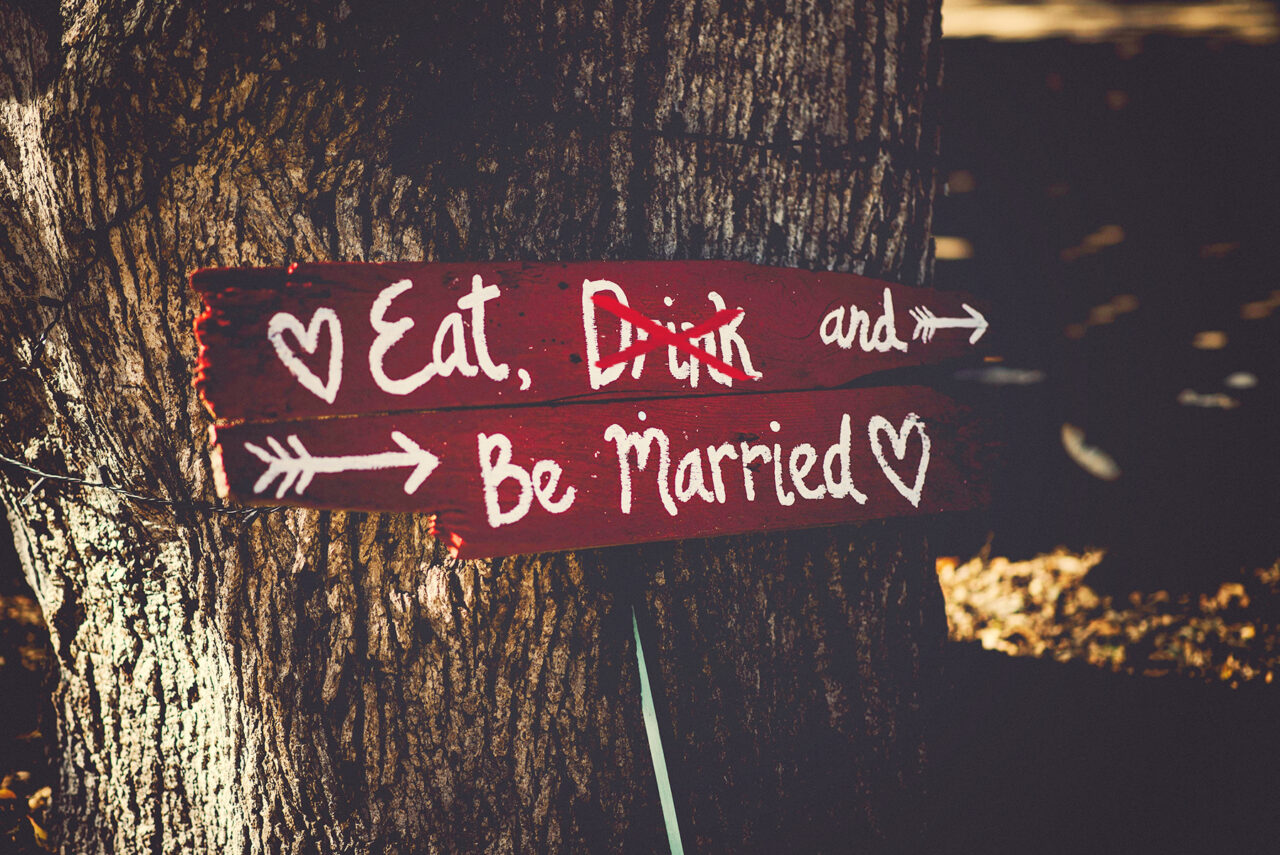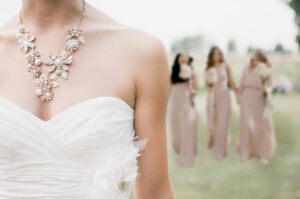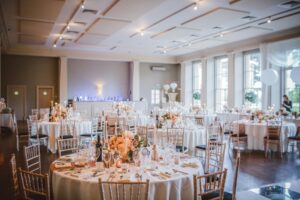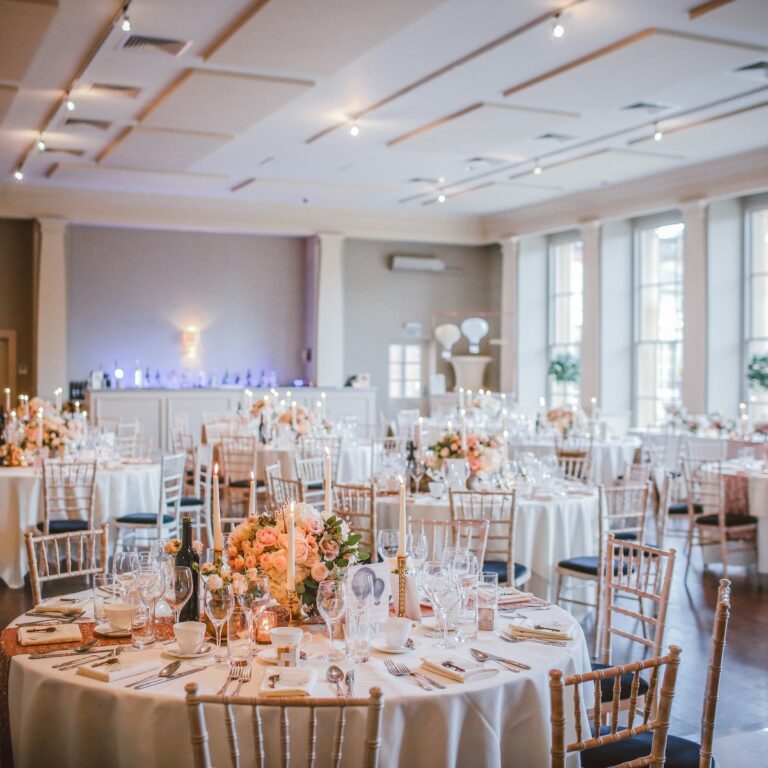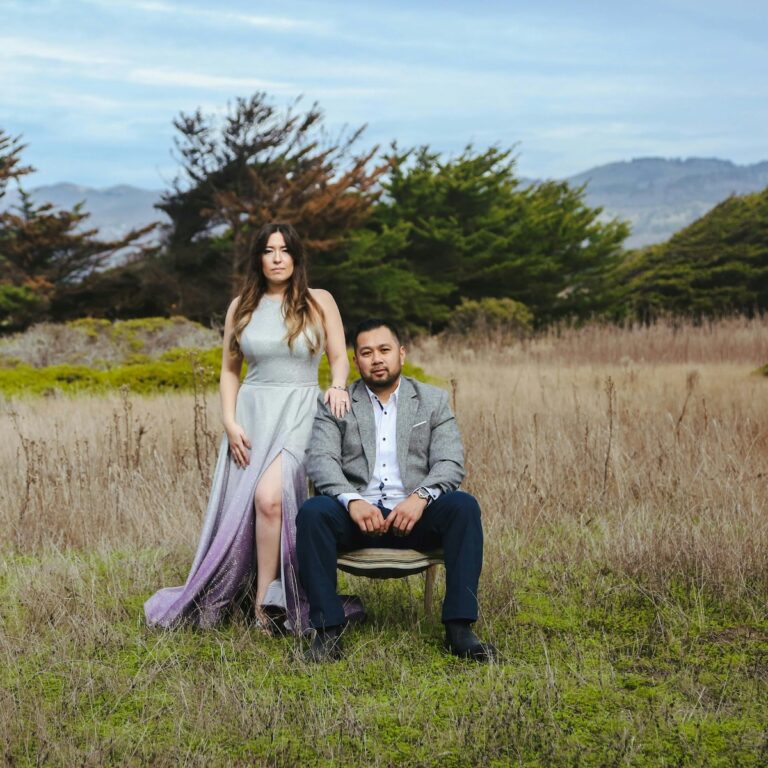Our culture normalizes alcohol just about everywhere—especially when it comes to weddings. But do you have to serve alcohol at your reception, just because it’s the norm?
Absolutely not!
Dry weddings aren’t terribly common, but they’re far from rare. Religious reasons, substance issues for anyone in attendance, budget concerns, venue rules: there’s no shortage of reasons not to serve alcohol, and all are completely valid.
Still—there is a right way to have a dry wedding…and some not-so-great ways that will make your decision even less popular with some of your guests.
7 Tips for Brides Considering a No-Alcohol Reception

1. Whatever you do offer, make it completely free to your guests.
I touch on this later (see #7), but I’m a firm believer in the rule that your guests should never have to open their wallets more than twice for your wedding:
- Once to purchase your gift,
- And again for their attire, travel, etc.
That’s it. The second they step foot into your reception, anything and everything you offer should be free to them.
Why? Because the reception is their thank-you gift.
Yep, you read that right—the reception is not for the bride and groom. That’s what the ceremony was for. The reception is to thank your guests for attending your wedding, and supporting your relationship.
And asking anyone to pay for part of their own thank-you gift is, in my strong opinion, not cool.
So whether you offer a fully stocked bar with top-shelf liquor, or a table with dispensers full of ice water and lemonade—your guests should be able to enjoy it without spending a dime.
2. You don’t have to tell guests it’ll be a dry wedding, but you should.
While there’s no hard-and-fast rule that says you absolutely have to “warn” guests your wedding will be dry, it’s polite and considerate to give a heads up anyway.
Bottom line, people expect alcohol at weddings. Outside of certain religious circles, dry weddings aren’t exactly common—so it’s nice to let them know what they can expect.
Look at this way: if you were attending a wedding and all the food were vegetarian, no kids were allowed, or the ceremony was atop a mountain and required a 1-mile hike on your part—wouldn’t you like to know those things in advance?
Anything off the beaten path, even by a little, should be communicated to guests as early as possible in your wedding plans.
3. No, you don’t have to explain your reasoning to anyone.
Perhaps counterintuitively (after all, I did just say you should tell guests ahead of time that your wedding will be dry), you don’t owe anyone an explanation for your choice. You should give notice, but you don’t have to give a reason.
Why you’re having an alcohol-free wedding is your business, no one else’s.
Whether it’s because your families, spouse, or yourself struggle with addiction, you just don’t enjoy people drinking heavily, or because alcohol isn’t in your budget—you are not required to tell anyone.
That said, yes: people will invent their own reasons if one isn’t provided for them. And if that speculation bothers you, feel free to set the record straight. But never feel obligated.

4. Consider choosing a wedding date & time where no alcohol makes sense anyway.
A dry wedding is far less surprising to guests at certain times versus others.
For example: a Saturday night wedding full of loud music and dancing, running from 6 to midnight, is more likely to serve alcohol than a Sunday afternoon wedding.
You and your fiancé might decide that an alternative date and time (or even overall aesthetic, such as quiet and elegant vs. a loud party atmosphere) suit your wishes for a dry wedding better.
Of course, your wedding can occur at any time and date. And no-alcohol weddings can still feel like wild parties! There’s no rule that says you have to give up dancing and loud music when you give up the drinks.
But we also have to face facts, here: some guests won’t cut loose if they’re sober. Some expect to drink on a Saturday evening, and will behave differently if that expectation is subverted.
It’s not a bad thing—just how it is. Playing into that reality, instead of fighting it, with a less traditional time and date can help.
And as a bonus, Sunday weddings or earlier-in-the-day time slots are usually cheaper at venues than Saturday night.
If you decide to go this path, just make sure it’s not too late to change your wedding date.
5. Try not to judge guests who get upset about your dry wedding.
A former friend of mine initially decided her wedding would not have alcohol. No beer, no wine: not a drop.
That isn’t why she’s my former friend, mind you. Rather, it was the result of bridezilla behavior—which included how she reacted to guests’ reactions of her dry wedding announcement.
“Pathetic,” she clucked, when people commented negatively on her choice. “These people can’t go one day without drinking?”
Here’s the thing—or, actually, several things:
- Her wedding was on a Saturday evening.
- The ceremony was at 5 pm, with the reception running from 6 to 11.
- It was the middle of summer, one of the hottest days of the year.
- Most of her guests were in their early to mid-twenties.
- She’d cited budget concerns, but had already announced her honeymoon would be tropical—and expensive.
- She drank frequently herself.
- In fact, she planned on having “secret champagne” tucked away in her bridal suite!
Was it really that surprising some people were upset with her decision?
Bottom line, there was no valid reason for her not to serve alcohol.
Not that she needed one, of course. But to then pass harsh judgement on her guests for not celebrating her choice—it simply wasn’t a good look.
Chances are, your dry wedding has a much more valid reason behind it than my ex-friend’s. And hopefully, you’re not passing judgement on guests who get upset or annoyed at the no-alcohol aspect.
But if you are passing judgement, exercise caution.
Yes, there will be some people who get too upset, and perhaps use alcohol inappropriately.
But most guests will simply be griping because they (reasonably) expect alcohol at weddings. That’s not pathetic. It’s just part of wedding culture in most circles.

6. If liquor is the real issue, consider serving only beer and wine.
Liquor is a different beast than beer and wine.
With beer or wine, your drinking is more paced—you’re consuming more liquid, taking sips versus shots, and drinking less alcohol per volume of each beverage.
But with liquor, things can go from zero to sixty way too fast. And some guests simply can’t handle the hard stuff, especially when it comes in the temptation of an open bar.
If you’re concerned about guests going overboard, consider limiting your bar menu to just a few popular beer varieties and three or four wine choices (include some white and some red, some dry, and some on the sweeter side).
These options offer plenty of variety without breaking the bank. And guests will be far less likely to overdue the drinking, once liquor is out of the equation.
Alternatively, you can offer some liquor—like pre-mixed signature cocktails, where you or a bartender control how much alcohol goes into each drink.
7. If money is the issue, do not resort to a cash bar instead.
Circling back to #1 on this list: don’t make your guests pay for anything more than they already have.
I realize this isn’t everyone’s sentiment: in fact, some social circles or cultures have normalized cash bars or drink tickets (where guests get one or two drinks free, but pay for the rest) and don’t find it tacky at all.
I’m not part of those circles or cultures, hence my differing opinion. Cash bars, where I’m from, give an impression of the couple being cheap and less hospitable than if they’d offered free beverages—even if none have alcohol.
Perhaps I’m in the minority, however. Maybe some guests would rather see a cash bar than a dry wedding, so they at least have the option to drink if they want to.
While I admit this is just my opinion, I also know it’s shared by a lot of people out there—asking guests to pay for anything just feels wrong.
All that to say, if you do want a cash bar—go right ahead. But at least make the non-alcoholic options like water, lemonade, sodas, etc., free to your guests.
A happy medium might be free wine, beer, and non-alcoholic refreshments—but guests pay for their own liquor.
Personally, I’d still prefer to see no liquor over a cash-for-liquor option, but again: just my opinion. If it doesn’t feel wrong to you and your fiancé, go with the bar options you two feel are best.

Dry Weddings Are Still Just As Fun—If You Do Them Correctly
Above all else, I would warn guests ahead of time if your wedding will not serve alcohol.
You don’t have to be blunt or go into too much detail on your invitations or wedding website, however. A simple and quick heads-up will do: “Reception to follow with non-alcoholic beverages and hors d’oeuvres,” for example.
Remember: this is your wedding. What you serve your guests is entirely up to you, because it’s your money paying for it.
And if you’re worried guests won’t have as much fun without alcohol, don’t fret: some of the best receptions I’ve attended didn’t have a drop of booze in the house.
Alcohol can enhance a good time, or derail it and turn a fun evening into a mess. That risk is an understandable reason to cut the hard drinks altogether.
And all you really need for a great reception—which, at the end of the day, is just a really big party—is some music, great food, and the people you love most.
_____
Are you considering having a dry wedding? Share your challenges or worries below!

